Tax and Accounting Implications of Transfer Pricing
VerifiedAdded on 2023/04/20
|6
|1679
|308
AI Summary
This case study assignment explores the tax and accounting implications of transfer pricing for Goodwill Net Pvt Ltd. It discusses the concept of transfer pricing and its impact on inventory costs, supply chain levels, and profits. The case study also analyzes the socio-political, ethical, and economic repercussions of transfer pricing. Subject: Accounting, Course Code: N/A, Course Name: N/A, College/University: N/A
Contribute Materials
Your contribution can guide someone’s learning journey. Share your
documents today.

CASE STUDY ASSIGNMENT 2
1
1
Secure Best Marks with AI Grader
Need help grading? Try our AI Grader for instant feedback on your assignments.
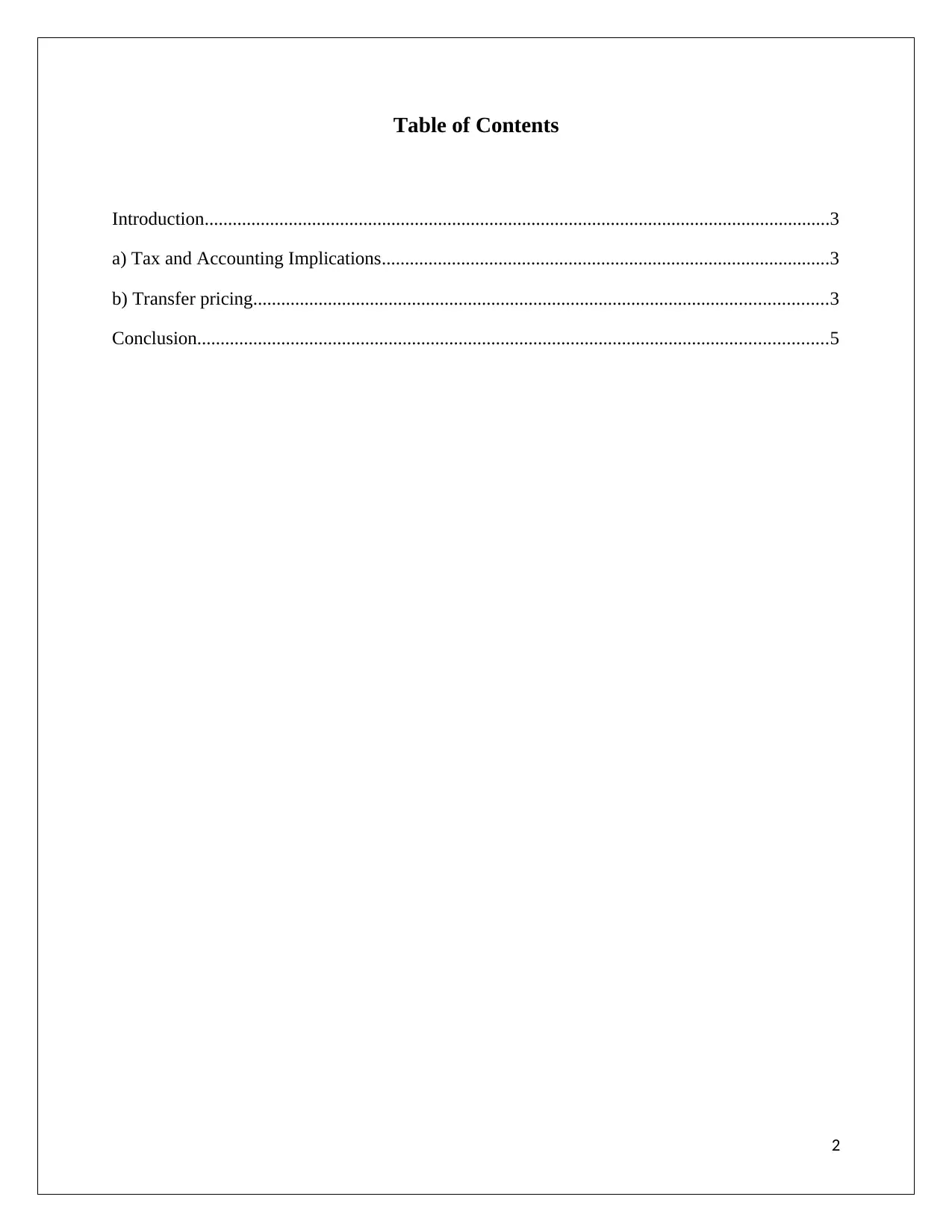
Table of Contents
Introduction......................................................................................................................................3
a) Tax and Accounting Implications................................................................................................3
b) Transfer pricing...........................................................................................................................3
Conclusion.......................................................................................................................................5
2
Introduction......................................................................................................................................3
a) Tax and Accounting Implications................................................................................................3
b) Transfer pricing...........................................................................................................................3
Conclusion.......................................................................................................................................5
2
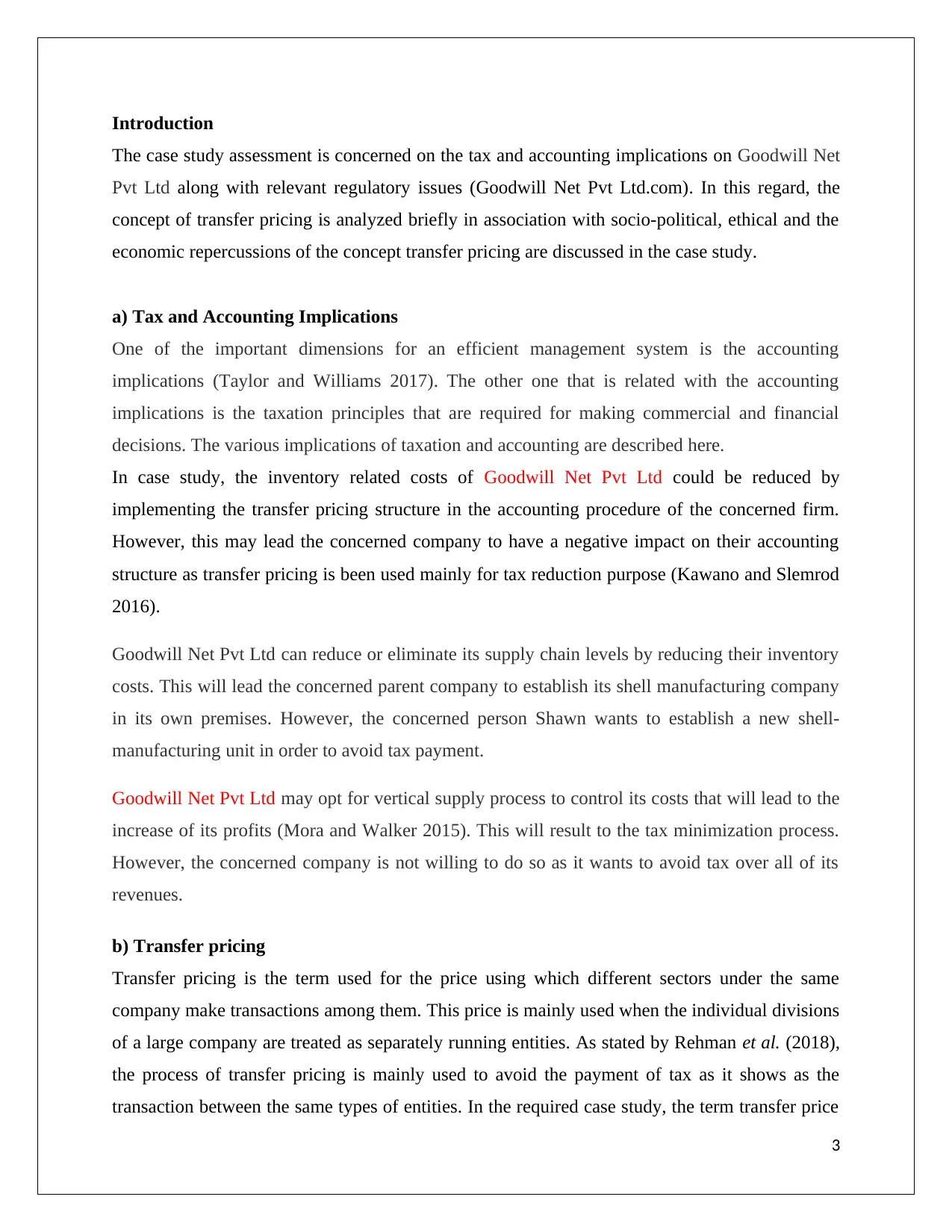
Introduction
The case study assessment is concerned on the tax and accounting implications on Goodwill Net
Pvt Ltd along with relevant regulatory issues (Goodwill Net Pvt Ltd.com). In this regard, the
concept of transfer pricing is analyzed briefly in association with socio-political, ethical and the
economic repercussions of the concept transfer pricing are discussed in the case study.
a) Tax and Accounting Implications
One of the important dimensions for an efficient management system is the accounting
implications (Taylor and Williams 2017). The other one that is related with the accounting
implications is the taxation principles that are required for making commercial and financial
decisions. The various implications of taxation and accounting are described here.
In case study, the inventory related costs of Goodwill Net Pvt Ltd could be reduced by
implementing the transfer pricing structure in the accounting procedure of the concerned firm.
However, this may lead the concerned company to have a negative impact on their accounting
structure as transfer pricing is been used mainly for tax reduction purpose (Kawano and Slemrod
2016).
Goodwill Net Pvt Ltd can reduce or eliminate its supply chain levels by reducing their inventory
costs. This will lead the concerned parent company to establish its shell manufacturing company
in its own premises. However, the concerned person Shawn wants to establish a new shell-
manufacturing unit in order to avoid tax payment.
Goodwill Net Pvt Ltd may opt for vertical supply process to control its costs that will lead to the
increase of its profits (Mora and Walker 2015). This will result to the tax minimization process.
However, the concerned company is not willing to do so as it wants to avoid tax over all of its
revenues.
b) Transfer pricing
Transfer pricing is the term used for the price using which different sectors under the same
company make transactions among them. This price is mainly used when the individual divisions
of a large company are treated as separately running entities. As stated by Rehman et al. (2018),
the process of transfer pricing is mainly used to avoid the payment of tax as it shows as the
transaction between the same types of entities. In the required case study, the term transfer price
3
The case study assessment is concerned on the tax and accounting implications on Goodwill Net
Pvt Ltd along with relevant regulatory issues (Goodwill Net Pvt Ltd.com). In this regard, the
concept of transfer pricing is analyzed briefly in association with socio-political, ethical and the
economic repercussions of the concept transfer pricing are discussed in the case study.
a) Tax and Accounting Implications
One of the important dimensions for an efficient management system is the accounting
implications (Taylor and Williams 2017). The other one that is related with the accounting
implications is the taxation principles that are required for making commercial and financial
decisions. The various implications of taxation and accounting are described here.
In case study, the inventory related costs of Goodwill Net Pvt Ltd could be reduced by
implementing the transfer pricing structure in the accounting procedure of the concerned firm.
However, this may lead the concerned company to have a negative impact on their accounting
structure as transfer pricing is been used mainly for tax reduction purpose (Kawano and Slemrod
2016).
Goodwill Net Pvt Ltd can reduce or eliminate its supply chain levels by reducing their inventory
costs. This will lead the concerned parent company to establish its shell manufacturing company
in its own premises. However, the concerned person Shawn wants to establish a new shell-
manufacturing unit in order to avoid tax payment.
Goodwill Net Pvt Ltd may opt for vertical supply process to control its costs that will lead to the
increase of its profits (Mora and Walker 2015). This will result to the tax minimization process.
However, the concerned company is not willing to do so as it wants to avoid tax over all of its
revenues.
b) Transfer pricing
Transfer pricing is the term used for the price using which different sectors under the same
company make transactions among them. This price is mainly used when the individual divisions
of a large company are treated as separately running entities. As stated by Rehman et al. (2018),
the process of transfer pricing is mainly used to avoid the payment of tax as it shows as the
transaction between the same types of entities. In the required case study, the term transfer price
3
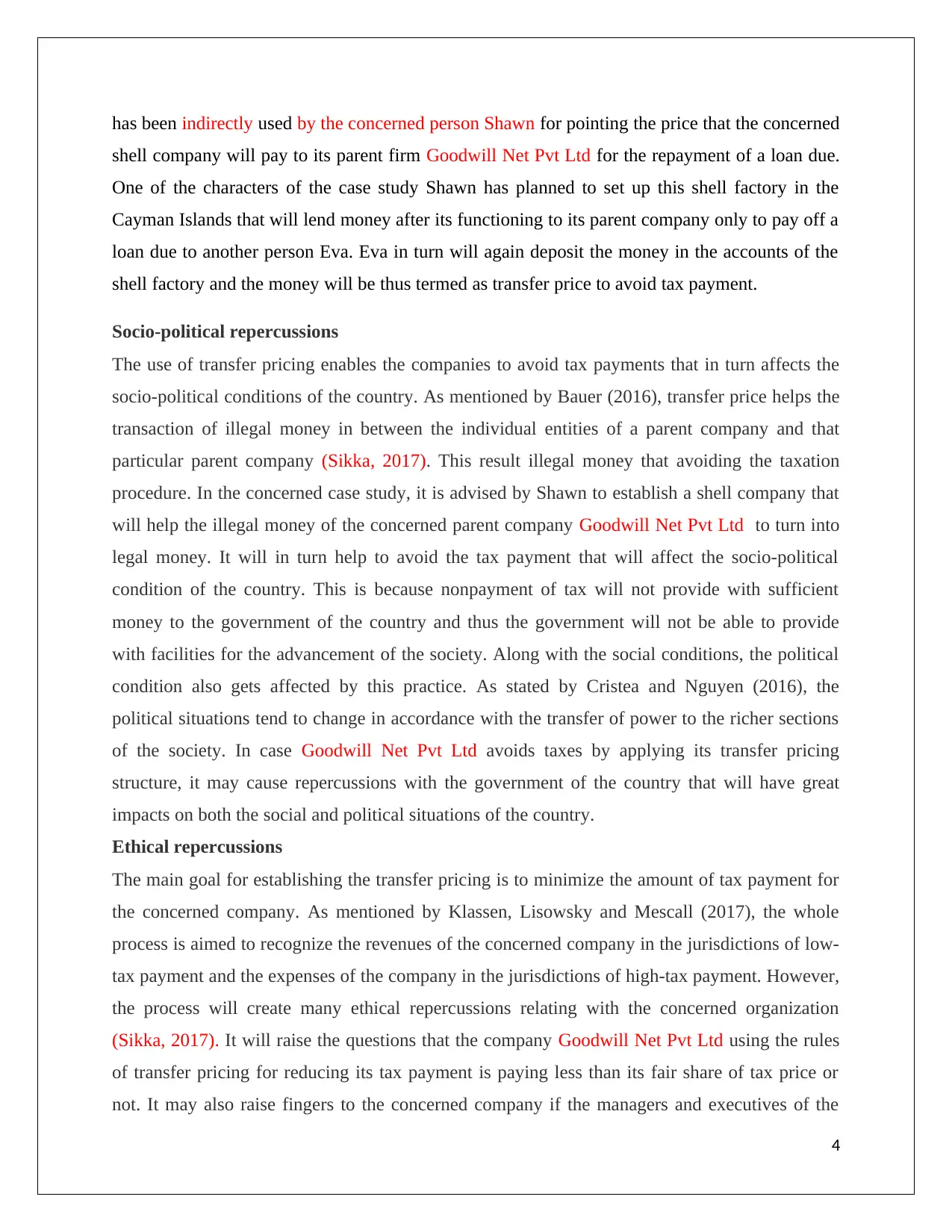
has been indirectly used by the concerned person Shawn for pointing the price that the concerned
shell company will pay to its parent firm Goodwill Net Pvt Ltd for the repayment of a loan due.
One of the characters of the case study Shawn has planned to set up this shell factory in the
Cayman Islands that will lend money after its functioning to its parent company only to pay off a
loan due to another person Eva. Eva in turn will again deposit the money in the accounts of the
shell factory and the money will be thus termed as transfer price to avoid tax payment.
Socio-political repercussions
The use of transfer pricing enables the companies to avoid tax payments that in turn affects the
socio-political conditions of the country. As mentioned by Bauer (2016), transfer price helps the
transaction of illegal money in between the individual entities of a parent company and that
particular parent company (Sikka, 2017). This result illegal money that avoiding the taxation
procedure. In the concerned case study, it is advised by Shawn to establish a shell company that
will help the illegal money of the concerned parent company Goodwill Net Pvt Ltd to turn into
legal money. It will in turn help to avoid the tax payment that will affect the socio-political
condition of the country. This is because nonpayment of tax will not provide with sufficient
money to the government of the country and thus the government will not be able to provide
with facilities for the advancement of the society. Along with the social conditions, the political
condition also gets affected by this practice. As stated by Cristea and Nguyen (2016), the
political situations tend to change in accordance with the transfer of power to the richer sections
of the society. In case Goodwill Net Pvt Ltd avoids taxes by applying its transfer pricing
structure, it may cause repercussions with the government of the country that will have great
impacts on both the social and political situations of the country.
Ethical repercussions
The main goal for establishing the transfer pricing is to minimize the amount of tax payment for
the concerned company. As mentioned by Klassen, Lisowsky and Mescall (2017), the whole
process is aimed to recognize the revenues of the concerned company in the jurisdictions of low-
tax payment and the expenses of the company in the jurisdictions of high-tax payment. However,
the process will create many ethical repercussions relating with the concerned organization
(Sikka, 2017). It will raise the questions that the company Goodwill Net Pvt Ltd using the rules
of transfer pricing for reducing its tax payment is paying less than its fair share of tax price or
not. It may also raise fingers to the concerned company if the managers and executives of the
4
shell company will pay to its parent firm Goodwill Net Pvt Ltd for the repayment of a loan due.
One of the characters of the case study Shawn has planned to set up this shell factory in the
Cayman Islands that will lend money after its functioning to its parent company only to pay off a
loan due to another person Eva. Eva in turn will again deposit the money in the accounts of the
shell factory and the money will be thus termed as transfer price to avoid tax payment.
Socio-political repercussions
The use of transfer pricing enables the companies to avoid tax payments that in turn affects the
socio-political conditions of the country. As mentioned by Bauer (2016), transfer price helps the
transaction of illegal money in between the individual entities of a parent company and that
particular parent company (Sikka, 2017). This result illegal money that avoiding the taxation
procedure. In the concerned case study, it is advised by Shawn to establish a shell company that
will help the illegal money of the concerned parent company Goodwill Net Pvt Ltd to turn into
legal money. It will in turn help to avoid the tax payment that will affect the socio-political
condition of the country. This is because nonpayment of tax will not provide with sufficient
money to the government of the country and thus the government will not be able to provide
with facilities for the advancement of the society. Along with the social conditions, the political
condition also gets affected by this practice. As stated by Cristea and Nguyen (2016), the
political situations tend to change in accordance with the transfer of power to the richer sections
of the society. In case Goodwill Net Pvt Ltd avoids taxes by applying its transfer pricing
structure, it may cause repercussions with the government of the country that will have great
impacts on both the social and political situations of the country.
Ethical repercussions
The main goal for establishing the transfer pricing is to minimize the amount of tax payment for
the concerned company. As mentioned by Klassen, Lisowsky and Mescall (2017), the whole
process is aimed to recognize the revenues of the concerned company in the jurisdictions of low-
tax payment and the expenses of the company in the jurisdictions of high-tax payment. However,
the process will create many ethical repercussions relating with the concerned organization
(Sikka, 2017). It will raise the questions that the company Goodwill Net Pvt Ltd using the rules
of transfer pricing for reducing its tax payment is paying less than its fair share of tax price or
not. It may also raise fingers to the concerned company if the managers and executives of the
4
Secure Best Marks with AI Grader
Need help grading? Try our AI Grader for instant feedback on your assignments.
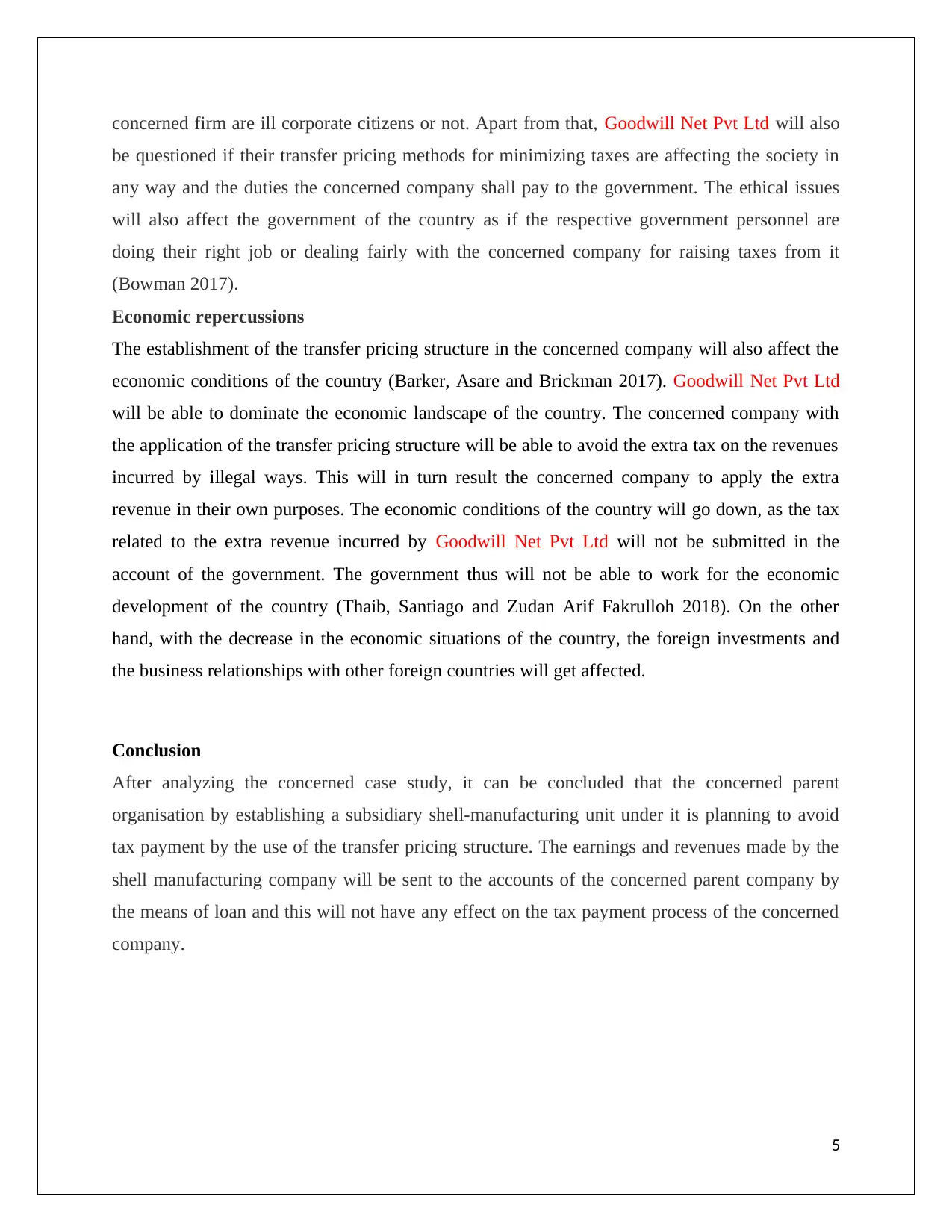
concerned firm are ill corporate citizens or not. Apart from that, Goodwill Net Pvt Ltd will also
be questioned if their transfer pricing methods for minimizing taxes are affecting the society in
any way and the duties the concerned company shall pay to the government. The ethical issues
will also affect the government of the country as if the respective government personnel are
doing their right job or dealing fairly with the concerned company for raising taxes from it
(Bowman 2017).
Economic repercussions
The establishment of the transfer pricing structure in the concerned company will also affect the
economic conditions of the country (Barker, Asare and Brickman 2017). Goodwill Net Pvt Ltd
will be able to dominate the economic landscape of the country. The concerned company with
the application of the transfer pricing structure will be able to avoid the extra tax on the revenues
incurred by illegal ways. This will in turn result the concerned company to apply the extra
revenue in their own purposes. The economic conditions of the country will go down, as the tax
related to the extra revenue incurred by Goodwill Net Pvt Ltd will not be submitted in the
account of the government. The government thus will not be able to work for the economic
development of the country (Thaib, Santiago and Zudan Arif Fakrulloh 2018). On the other
hand, with the decrease in the economic situations of the country, the foreign investments and
the business relationships with other foreign countries will get affected.
Conclusion
After analyzing the concerned case study, it can be concluded that the concerned parent
organisation by establishing a subsidiary shell-manufacturing unit under it is planning to avoid
tax payment by the use of the transfer pricing structure. The earnings and revenues made by the
shell manufacturing company will be sent to the accounts of the concerned parent company by
the means of loan and this will not have any effect on the tax payment process of the concerned
company.
5
be questioned if their transfer pricing methods for minimizing taxes are affecting the society in
any way and the duties the concerned company shall pay to the government. The ethical issues
will also affect the government of the country as if the respective government personnel are
doing their right job or dealing fairly with the concerned company for raising taxes from it
(Bowman 2017).
Economic repercussions
The establishment of the transfer pricing structure in the concerned company will also affect the
economic conditions of the country (Barker, Asare and Brickman 2017). Goodwill Net Pvt Ltd
will be able to dominate the economic landscape of the country. The concerned company with
the application of the transfer pricing structure will be able to avoid the extra tax on the revenues
incurred by illegal ways. This will in turn result the concerned company to apply the extra
revenue in their own purposes. The economic conditions of the country will go down, as the tax
related to the extra revenue incurred by Goodwill Net Pvt Ltd will not be submitted in the
account of the government. The government thus will not be able to work for the economic
development of the country (Thaib, Santiago and Zudan Arif Fakrulloh 2018). On the other
hand, with the decrease in the economic situations of the country, the foreign investments and
the business relationships with other foreign countries will get affected.
Conclusion
After analyzing the concerned case study, it can be concluded that the concerned parent
organisation by establishing a subsidiary shell-manufacturing unit under it is planning to avoid
tax payment by the use of the transfer pricing structure. The earnings and revenues made by the
shell manufacturing company will be sent to the accounts of the concerned parent company by
the means of loan and this will not have any effect on the tax payment process of the concerned
company.
5
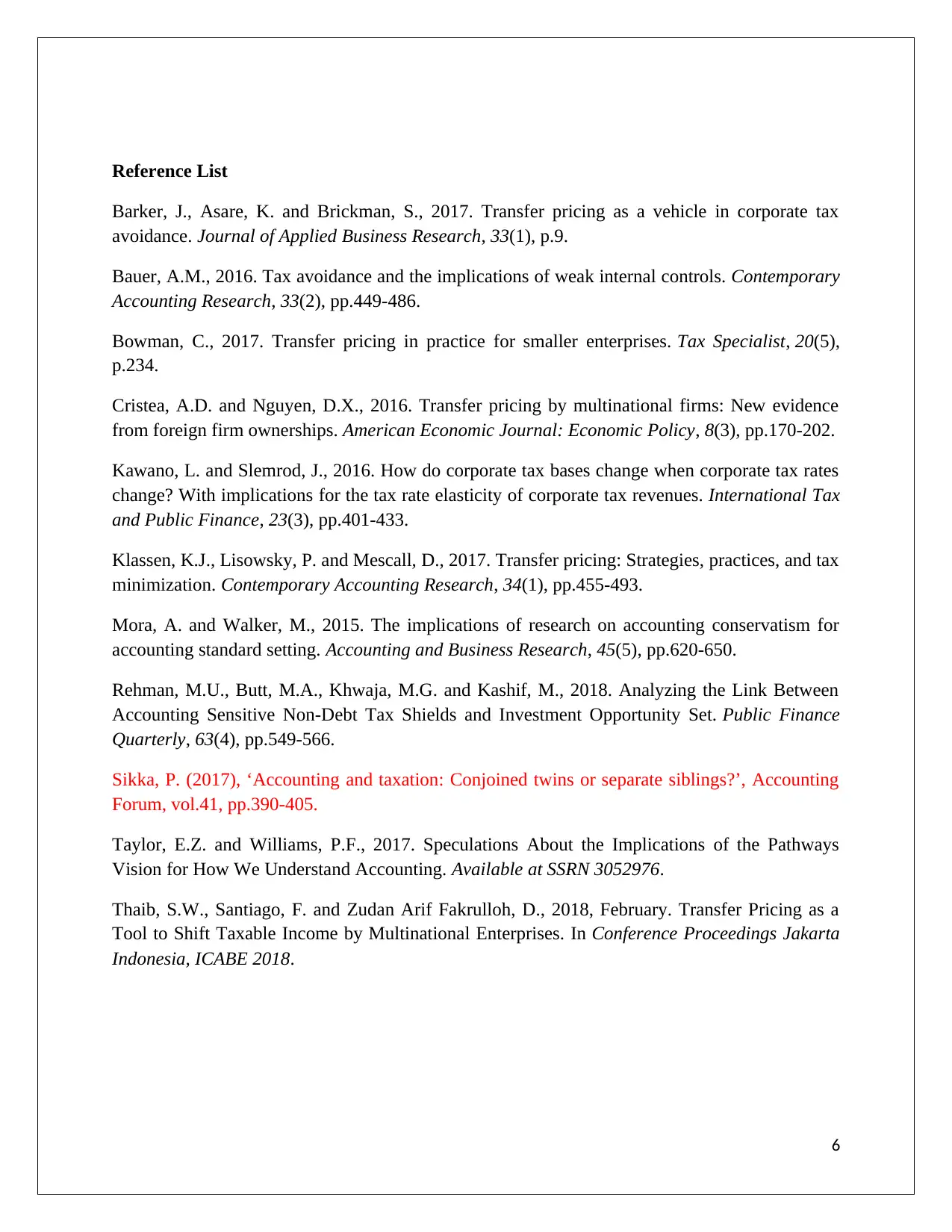
Reference List
Barker, J., Asare, K. and Brickman, S., 2017. Transfer pricing as a vehicle in corporate tax
avoidance. Journal of Applied Business Research, 33(1), p.9.
Bauer, A.M., 2016. Tax avoidance and the implications of weak internal controls. Contemporary
Accounting Research, 33(2), pp.449-486.
Bowman, C., 2017. Transfer pricing in practice for smaller enterprises. Tax Specialist, 20(5),
p.234.
Cristea, A.D. and Nguyen, D.X., 2016. Transfer pricing by multinational firms: New evidence
from foreign firm ownerships. American Economic Journal: Economic Policy, 8(3), pp.170-202.
Kawano, L. and Slemrod, J., 2016. How do corporate tax bases change when corporate tax rates
change? With implications for the tax rate elasticity of corporate tax revenues. International Tax
and Public Finance, 23(3), pp.401-433.
Klassen, K.J., Lisowsky, P. and Mescall, D., 2017. Transfer pricing: Strategies, practices, and tax
minimization. Contemporary Accounting Research, 34(1), pp.455-493.
Mora, A. and Walker, M., 2015. The implications of research on accounting conservatism for
accounting standard setting. Accounting and Business Research, 45(5), pp.620-650.
Rehman, M.U., Butt, M.A., Khwaja, M.G. and Kashif, M., 2018. Analyzing the Link Between
Accounting Sensitive Non-Debt Tax Shields and Investment Opportunity Set. Public Finance
Quarterly, 63(4), pp.549-566.
Sikka, P. (2017), ‘Accounting and taxation: Conjoined twins or separate siblings?’, Accounting
Forum, vol.41, pp.390-405.
Taylor, E.Z. and Williams, P.F., 2017. Speculations About the Implications of the Pathways
Vision for How We Understand Accounting. Available at SSRN 3052976.
Thaib, S.W., Santiago, F. and Zudan Arif Fakrulloh, D., 2018, February. Transfer Pricing as a
Tool to Shift Taxable Income by Multinational Enterprises. In Conference Proceedings Jakarta
Indonesia, ICABE 2018.
6
Barker, J., Asare, K. and Brickman, S., 2017. Transfer pricing as a vehicle in corporate tax
avoidance. Journal of Applied Business Research, 33(1), p.9.
Bauer, A.M., 2016. Tax avoidance and the implications of weak internal controls. Contemporary
Accounting Research, 33(2), pp.449-486.
Bowman, C., 2017. Transfer pricing in practice for smaller enterprises. Tax Specialist, 20(5),
p.234.
Cristea, A.D. and Nguyen, D.X., 2016. Transfer pricing by multinational firms: New evidence
from foreign firm ownerships. American Economic Journal: Economic Policy, 8(3), pp.170-202.
Kawano, L. and Slemrod, J., 2016. How do corporate tax bases change when corporate tax rates
change? With implications for the tax rate elasticity of corporate tax revenues. International Tax
and Public Finance, 23(3), pp.401-433.
Klassen, K.J., Lisowsky, P. and Mescall, D., 2017. Transfer pricing: Strategies, practices, and tax
minimization. Contemporary Accounting Research, 34(1), pp.455-493.
Mora, A. and Walker, M., 2015. The implications of research on accounting conservatism for
accounting standard setting. Accounting and Business Research, 45(5), pp.620-650.
Rehman, M.U., Butt, M.A., Khwaja, M.G. and Kashif, M., 2018. Analyzing the Link Between
Accounting Sensitive Non-Debt Tax Shields and Investment Opportunity Set. Public Finance
Quarterly, 63(4), pp.549-566.
Sikka, P. (2017), ‘Accounting and taxation: Conjoined twins or separate siblings?’, Accounting
Forum, vol.41, pp.390-405.
Taylor, E.Z. and Williams, P.F., 2017. Speculations About the Implications of the Pathways
Vision for How We Understand Accounting. Available at SSRN 3052976.
Thaib, S.W., Santiago, F. and Zudan Arif Fakrulloh, D., 2018, February. Transfer Pricing as a
Tool to Shift Taxable Income by Multinational Enterprises. In Conference Proceedings Jakarta
Indonesia, ICABE 2018.
6
1 out of 6
Your All-in-One AI-Powered Toolkit for Academic Success.
+13062052269
info@desklib.com
Available 24*7 on WhatsApp / Email
![[object Object]](/_next/static/media/star-bottom.7253800d.svg)
Unlock your academic potential
© 2024 | Zucol Services PVT LTD | All rights reserved.


